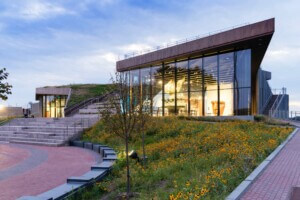A nearly 200-acre swath of land in Greene County, New York, that was once home to America’s oldest—and largest—private zoo has hit the market for $3.6 million with the potential to be transformed into housing, a scarcity across the Hudson Valley.
“The real value for this property is because of the lack of residential housing [in the region], and all the people moving up here,” Jason Karadus of Corcoran Country Living recently explained to the Times-Union. “I would be surprised if the purchaser isn’t going to develop it as residential housing.”
Located at 400 Game Farm Road in Catskill, the old zoo was established by New York banker Roland Lindemann in 1933 as the Catskill Game Farm; Lindemann eventually opened his menagerie to the public and began charging admission to what was then just a simple barnyard petting zoo with donkeys, sheep, and the like. But by the peak of the swinging 1950s and ’60s in the Borscht Belt, the Catskill Game Farm had evolved into a major regional tourist destination attracting roughly a half-million visitors per year. Beginning in 1958, Lindemann’s collection grew only larger and more exotic when the United States Department of Agriculture formally recognized the game farm as a zoo. It was home to thousands of animals over its 70-years in existence, including one YouTube-famous giraffe. In 2006, the still family-owned Catskill Game Farm was shuttered for good amid declining visitor numbers.
Six years later, the property—its original structures still very much standing and infrastructure intact—was purchased by Ben and Cathy Ballone for $100,000 and transformed into what remains probably the most singular lodging establishment on any side of the Hudson: an upscale glamping compound located at an abandoned zoo. Renamed The Old Game Farm, the Ballones cleared away 3.5 miles of paved walking trails and retained most of the roughly 100 zoo structures including, most notably, the old giraffe house, which they converted into the property’s nostalgia-inducing pièce de résistance: a 9,000-square-foot boutique hotel dubbed the Long Neck Inn.
The full transformation of the Catskill Game Farm from an abandoned zoo into an abandoned zoo that you can spend the night in without getting arrested for trespassing took the Ballones seven years to fully complete due to funding struggles, with the Long Neck Inn only opening in 2019. (Self-guided tours of the abandoned zoo and camping were available beginning in 2014). Pairing creepy abandoned place exploration (in a region famous for it) and amenity-driven winterized camping, The Old Game Farm is the perfect (and possibly only) place to “witness nature take back an American landmark” by day and soak in a hot tub under the stars by night.
As detailed by the New York Post, the Ballones didn’t hold onto the property for long, however, and sold it to a real estate investment group led by Sid Blauner for $1.9 million in November 2020. The following February, local media unveiled the new ownership group’s plans to build upon the Ballones’ original vision by converting other old animal shelters into additional lodging options, expanding the number of on-site amenities, and even bringing back some animals. As of this writing, the entire six-bedroom inn (it sleeps up to 20) and individual campsites can be rented via Airbnb or Tentrr, respectively, although that could soon change now that the property is back on the market.
Blauner, who is selling due to “ongoing uncertainty around the pandemic,” relayed to the Post that he hopes that the next owner keeps the property open to the public. But as the Times-Union noted, most interest so far has been from parties eyeing residential development, which means a unique slice of Catskills history could be razed.
“It’s unusual, particularly on the west side of the Hudson River and the Catskills area, to find large parcels of land that either aren’t protected as wetlands or a part of the watershed, that are conducive for residential development, and this one kind of is,” said Karadus with Corcoran.
You can view the full listing here.











